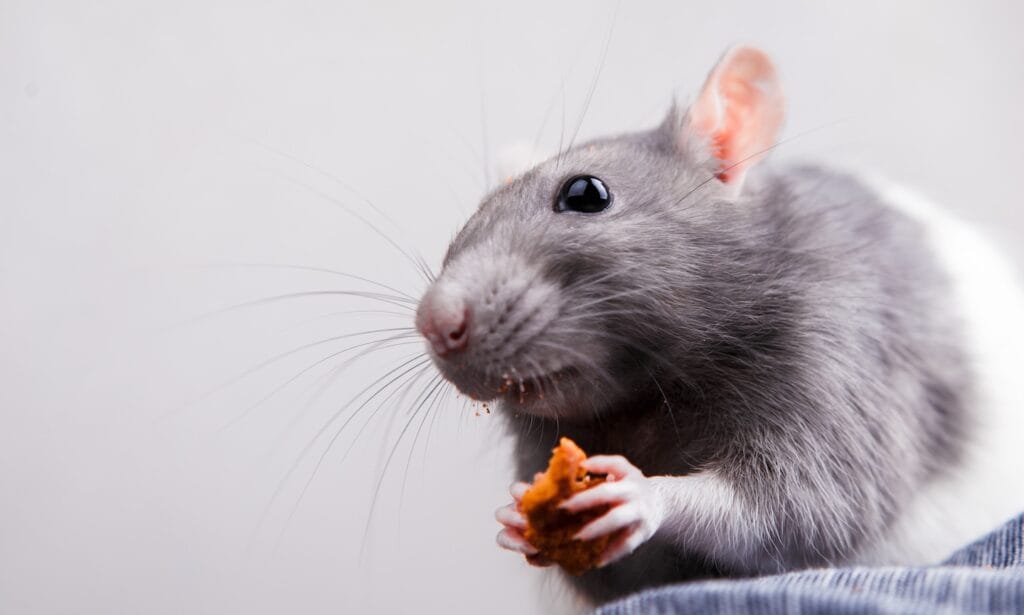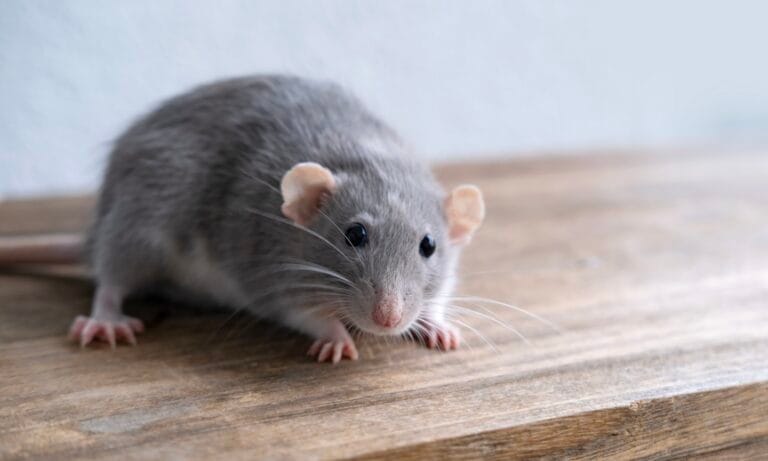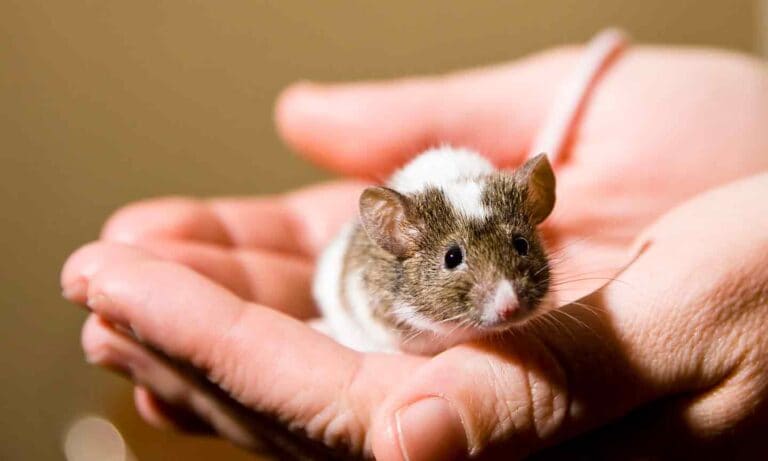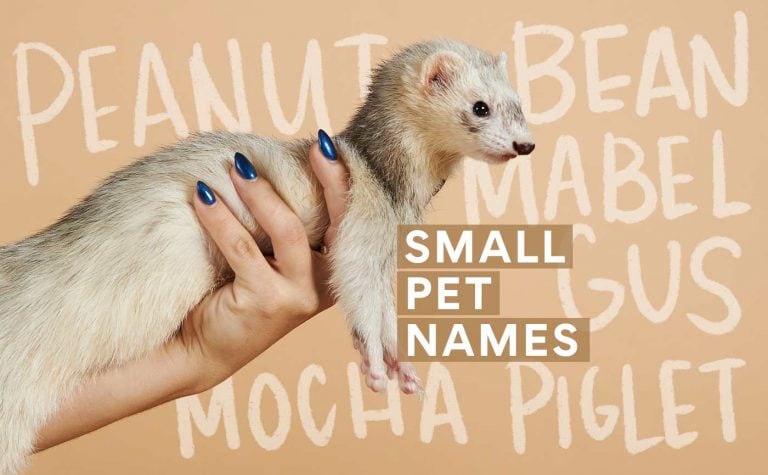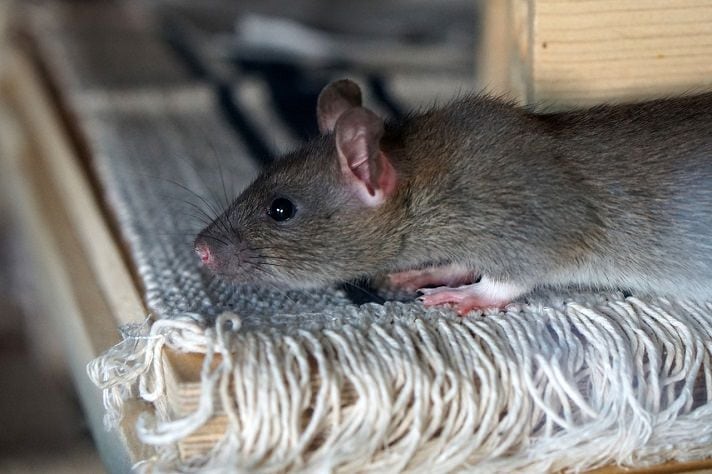Voracious little critters, rats have an appetite for seemingly anything that comes their way. But there are certain kinds of food that pet rats need to be their healthiest and happiest.
When it comes to what rats like to eat, it might not be the same diet as what vets say they should eat.
In This Guide:
What Can Rats Eat?
Rats are omnivores and will eat nearly anything you put in front of their whiskers. In the wild, these nocturnal creatures can make a meal of nearly anything—their diet is a mix of seeds, grains, vegetation, and even insects and other invertebrates.
While a pet rat certainly won’t need to scavenge as much as their cousins in the wild, pet parents should ensure their little friend consumes a diet that’s nutrient-rich and diverse enough for their omnivorous instincts.
But that doesn’t mean offering up just anything that crosses your kitchen counter. In fact, your rat’s favorite foods probably aren’t the healthiest choices.
Like humans, rats tend to overdo it on junk food when given the option between high-fat, high-sugar snacks and healthy ones. Obesity in rats is a serious health concern, so limiting snacks and making sure they’re eating the right amount can help fend off obesity and heart disease and help them live longer, happier lives.
What’s a Healthy Diet for Rats?
Pet rats need a healthy, balanced diet to help them thrive—not just treats and sweets that don’t necessarily meet their nutritional requirements (no matter how much they might beg).
A healthy diet for rats is like that of most other pet rodents, including mice. Their main food source should be from rat-specific pellets or rodent blocks, which are designed to meet their nutritional needs without adding empty calories that can lead to obesity.
Vets say it’s alright to add a few bites of fruit, veggies, and treats throughout the week for variety and enrichment. But rats should be encouraged to consume most of their calories from their rodent block, so they get the right nutrition (and don’t overeat).
Additionally, their high metabolism means adult rats may drink several tablespoons of water a day, so access to fresh water at all times is a must-have.
Pellets or a Rodent Block
Rat-specific pellets or a rodent block should be the “main dish” on your pet rat’s menu. Sandra Mitchell, DVM, DABVP, owner of All Creatures Veterinary Services, in Eddington, Maine, says that unlike seed mixes, from which rats will cherry-pick their preferred foods, a rodent block is formatted to ensure they eat a balanced diet.
Better yet, rodent blocks and pellets are formulated by calorie/nutritional value. This makes measuring the right amount easier, so you don’t accidentally overfeed your rat. Calorie restriction is critical for keeping your rat healthy since obesity in rats can lead to serious health issues. “The number of blocks is equal to the number of calories put into the enclosure, which are easy to count,” Dr. Mitchell says.
Treats
Rats can be bottomless pits, especially when it comes to treats. But just because they want to snack endlessly doesn’t mean they should.
A few small treats can go a long way—small bites of crackers or popcorn are OK to share with your rat if the amounts are limited and only offered a few times per week. That way, your whiskered friend will be encouraged to eat most of their calories from a rodent block and not just stuff their cheeks with popcorn.
You can use the occasional treat as a reward for training sessions, or to offer a little extra variety in their mealtime routine.
Veggies
Veggies are packed with vitamins and minerals, contain moisture to help rats stay hydrated, and help their mealtimes stay interesting by providing different flavors and textures.
Rats can have a few bites of fresh veggies each day, but these should still be given in limited amounts so that they’re encouraged to eat most of their calories from the specially formulated rodent block.
María Juárez Byrd, DVM, an exotic and small animal veterinarian in Jefferson City, Missouri, says there are several vegetables rats can eat in small quantities:
- Broccoli
- Cucumber
- Zucchini
- Pumpkin
- Carrots
- Bell peppers
- Peas
- Corn
- Green beans
Fruit
Since fruit is higher in sugar than most vegetables, rats should only get a few small bites of fruit a few times each week. Blueberries, kiwi, apples (without the seeds!), melon, and strawberries are all safe to share with your small furry friend.
Avoid citrus fruits like orange, lemon, and grapefruit—these are toxic to rats.
Proteins
Rats can have a little extra protein two to three times per week, but they don’t need much. If you want to supplement your pet’s rodent block with a little variety, these proteins are OK to share with your rat:
- Hard-boiled eggs
- Cooked chicken
- Cooked shrimp
- Food-grade crickets or mealworms
Grains and Seeds
Dr. Mitchell says a bite or two of certain grains and seeds is fine for your whiskered friend to munch on, but should only be offered occasionally (one to two times per week). Safe grains and seeds include:
- Pasta (cooked or uncooked)
- Popcorn (popped, unflavored, unsalted, unbuttered)
- Crackers (bland types in moderation)
- Seeds (bland types, such as sunflower, pumpkin, flax, chia, and sesame, in moderation, such as a quarter teaspoon)
- Nuts (bland types, such as almonds, pistachios, hazelnuts, cashews, and walnuts, in moderation, such as one nut)
What Not To Feed Your Rat
Dr. Mitchell says foods that are sweet or contain lots of salt or sugar—like cookies, ice cream, potato chips, chocolate, and candy—should not be shared with rats. “Not only are they not nutritionally beneficial, but they also contain a lot of empty calories and may make them sick,” she says.
Never share the following foods with your rat, as they can be toxic and cause them serious harm:
- Chocolate
- Caffeine
- Alcohol
- Onion
- Garlic
- Rhubarb
- Uncooked potatoes
- Avocado skin and pit
How To Find the Best Food for Your Rat
When choosing food for your rat, look for a species-specific rodent block or pellet food that’s free from artificial flavors, colors, and preservatives.
Dr. Byrd says to look for pellets that are made from a mix of 16–23% protein, around 5% fat, and a minimum of 18% fiber. Any pellets or rodent blocks should be formulated by a board-certified nutritionist to ensure balance and safety.
If you have questions about your pet rat’s dietary needs, talk to a vet or nutritionist. They can help you determine what a healthy menu looks like for your furry friend.
Obesity in Rats
Don’t let their small size fool you—rats are voracious eaters with a tendency to overeat if allowed. Keeping a high-quality rodent block as their primary source of nutrition can help avoid overeating, with veggies and other treats as supplementary snacks.
Dr. Byrd recommends keeping a gram scale at home to monitor your rat’s weight, which is an early indicator of health. Find out from your vet what your rat’s ideal weight should be, which can vary by sex and species.
Be diligent about checking their weight and teeth once a week, looking to see that all four front teeth are neatly aligned near the top of the mouth. Call your vet if your rat has any unexplained weight loss or gain, since weight change can often be caused by underlying disease.
FAQs About What Rats Eat
Q:What do rats eat at night?
A:In addition to their food, don’t be alarmed if you wake up in the middle of the night to find your rat eating their poop. Rats are coprophagic animals, meaning they eat some of their own feces to get vitamins that they need. It’s totally normal, usually happens at night, and they’re not alone in the habit—other small mammals like guinea pigs, rabbits, and hamsters do this too.
Q:Do rats eat insects?
A:Rats in the wild do eat insects, but pet rats don’t need to eat insects since they get their nutrition from a rodent block. Insects carry parasites that can make your rat sick, but food-grade crickets or mealworms can be OK as an occasional treat. Just don’t feed your rat any average bug found in your house or outside, since it can make them sick!
Your vet is a great resource when it comes to nutritional advice for your rat. Check with them if you have any questions or concerns about your rat’s health. They’ll be able to offer advice that considers your pet’s health history, breed, age, and weight.
Like this story? Check out more of our favorite reads:
Share:
